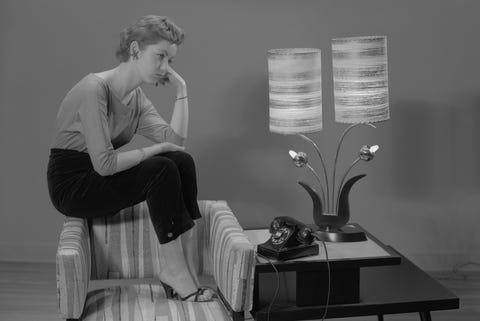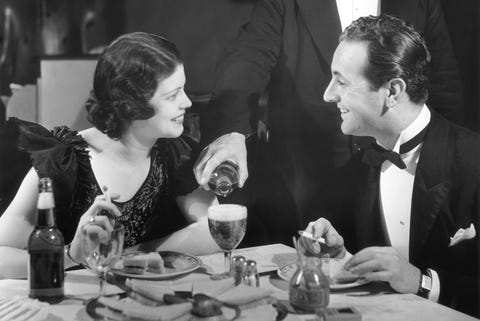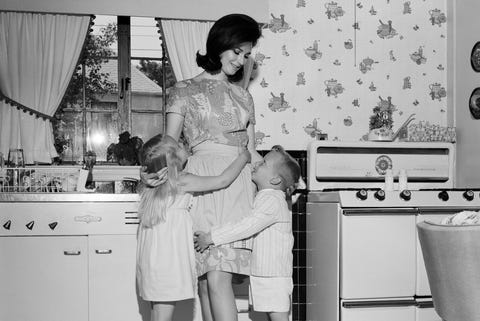Learn how to get
back into the romance game after a major split.

Dating
after divorce can be a minefield for the midlife woman. Perhaps even thornier than
pondering what to wear on a date, where to go, who pays — not to mention how
you even find people to date in this brave new world of Internet match-ups — is
getting over your reluctance to take a stab at it. Why is it so hard?
"A
divorced woman may feel very vulnerable at this stage, in part because she used
to have a spouse to 'protect' her and now she has to go out into the world on
her own," says Diana Kirschner, PhD, author of Sealing the Deal: The Love Mentor's Guide to Lasting Love.
But it's also tough, she adds, because once you're on the dating scene you can
feel like a teenager again, in that shaky, unconfident, not-sure-if-he'll-call
sort of way.
So
how can you make post-divorce dating — whether you're looking for a good time
or a good (relationship-minded) man — less daunting? Read on for tips that will
help you get back in Cupid's good graces.
1 FIGURE OUT IF YOU'RE READY.

Whether it's been one year or six since the divorce decree,
you may never know with absolute clarity that you're ready for another
relationship. Instead, "it's usually clear when you're not ready,"
says Susan Pease
Gadoua, a therapist and
author of Stronger Day by Day:
Reflections for Healing and Rebuilding After Divorce. That is, when the
very idea turns you off. But once the idea of going on a date comes into your
mind and you don't want to chase it out again, you're at least ready to start,
she says. If it's truly awful, you can take a step back and wait some more.
2 FEEL THE FEAR — AND DO IT ANYWAY.

Contemplating the dating scene, many divorced women feel not
just garden-variety nerves, but "actual terror," says Dr. Kirschner.
Just remember that your fears are normal — after all, you're dealing with or
have dealt with a major betrayal and upheaval — and that you don't have to jump all the way in.
"Dip a toe in at a time. Tell a few trusted friends that you're interested
in meeting people. Accept invitations to parties."
3 AVOID NEGATIVE THINKING.

While it's not unheard of for a woman wounded by a painful
divorce to make statements like "all men are jerks" or "all the good ones are taken," that's
obviously not a good mindset to have going into dating, says Dr. Kirschner.
"That kind of thinking can tank your mood — and cause you to limit your
chances of getting out there and finding love." By forcing yourself to keep
your negative thoughts in check, you'll soon be in the habit of thinking
optimistically, which will in turn make you more ready to date again.
4 KNOW THERE'S NOTHING WRONG WITH YOU.

A divorcée may also feel that there's
something "wrong" with her since her marriage fell apart, says Dr.
Kirschner. If that's the case, start training yourself now to recognize
self-sabotaging thoughts, and when self-doubts start to pop up,
"visualize a giant red stop sign, or a voice yelling, 'Stop!'" says
Dr. Kirschner.
5 DETERMINE YOUR DATING
INTENTION.

You've decided to start dating —
isn't that your "intention" right there? Not completely, says Dr.
Kirschner. "Sit down and craft a statement of what, exactly, you're after.
Is it a partner in life? A short-term liaison that might lead to something?
Just some fun for now? The idea is that you should consciously decide how you
want to proceed," which will in turn inform how you go about meeting
people.
6 RETHINK YOUR DEFINITION
OF DATING.

Gadoua, who runs dating workshops for
women, asks them to free-associate words that come to mind when they think of
"dating." Not surprisingly, words like "awful" and
"dreadful" come up. If you feel the same way, she offers this advice:
"I suggest you try to reframe it as an adventure, or as an
education," she says. "Dating can be a way to sharpen your social skills
too." And, of course, a way to get out of the house and have some fun!
7 GET ONLINE.

Possibly, the last time you dated there
wasn't even an Internet, much less Internet dating. But if you were thinking
that searching for companionship online is strictly for losers or perverts,
forget it — that's as outmoded as dial-up. "Online dating is not only
mainstream, it's one of the best ways to widen your search, rather than just
hoping that you'll meet someone in the coffee shop," says Dr. Kirschner.
And these days, there's a site for everyone, from eHarmony and Match to niche
sites like JDate. Check out our Guide to Online Dating to
learn the basics including setting up a profile to taking a relationship
offline.
8 DON'T DRAG OUT ONLINE
CONTACT.

Once you "meet" someone
online, Dr. Kirschner says it's easy to build up a fantasy of what he is like
based on his profile and the emails you exchange. "My rule of thumb is
to meet in person within two weeks of
making online contact." Might as well find out as soon as you can if the
chemistry is virtual — or real. Of course, when you do meet, take basic safety
precautions. "Tell a friend where you'll be and when you expect to be
home, and meet for coffee in a public place," suggests Dr. Kirschner.
9 REMEMBER THAT DATING IS
A NUMBERS GAME.

"Four out of five men you go out
with will disappear," says Dr. Kirschner bluntly. It's just the nature of
the dating world. He may have seemed great, but loses interest, or is dating
someone else, or has problems you will never know about. Don't take it personally,
and instead try to remember that if you're meeting a lot of people, the number
of bad apples will go up — but so will the odds that you'll meet a few good
apples too.
10 DATE AROUND.

Dr. Kirschner recommends, to start
by dating several guys at the same
time. For a couple of reasons: First, you're not putting all your
eggs — or hopes — into one basket. Second, you can compare what you like and
don't like. Maybe one guy is very funny, but you enjoy another man's
intellectual stimulation. "You can see what you might want in a
relationship going forward," she says, even if it's not with any of these
guys.
11 BUT
BE HONEST.

While Dr. Kirschner fully supports
seeing multiple people at one time when you first start dating, she does say
there's one caveat: making sure everyone knows. "Just say, 'I'm enjoying
dating you, but I want you to know that for now I'm also seeing others
casually."
12 DON'T
LET YOUR KIDS STOP YOU.

Hopefully it's obvious to you that if
you have children at home, you shouldn't bring dates around unless it's
somewhat serious. That said, don't let a fear of your children being upsetor
disapproving stop you from getting out there if you feel ready to. "Too
many women hide behind their kids as an excuse not to date," says Gadoua.
Be up-front and respectful, but don't apologize for wanting to date. "Most
children just want their parent to be happy, and may be less likely to object
than you imagine," she says.
https://www.womansday.com/relationships/dating-marriage/advice/g2824/tips-for-dating-after-a-divorce/